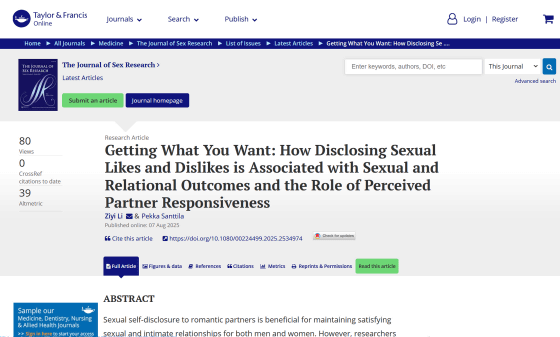How does communicating your sexual likes and dislikes to your partner affect the quality of your relationship?

Everyone has their 'sexual likes and dislikes,' and disclosing these sexual preferences and dislikes to their partners is considered important for maintaining a healthy romantic relationship. However, a study conducted in China showed that not all sexual self-disclosures have the same effect, and disclosing sexual likes and dislikes has different effects on relationships with partners.
Getting What You Want: How Disclosing Sexual Likes and Dislikes is Associated with Sexual and Relational Outcomes and the Role of Perceived Partner Responsiveness: The Journal of Sex Research: Vol 0, No 0 - Get Access

New study sheds light on how sexual self-disclosure relates to relationship quality
https://www.psypost.org/new-study-sheds-light-on-how-sexual-self-disclosure-relates-to-relationship-quality/
Previous research has linked sexual self-disclosure, or disclosing sexual likes and dislikes to a partner, to increased sexual satisfaction, relationship satisfaction, and emotional intimacy. Furthermore, within the theoretical framework of partner intimacy and sexual satisfaction, sharing sexual information within a positive relationship context promotes emotional intimacy and sexual harmony.
However, most research to date has treated sexual self-disclosure as a single, unchanging form of communication. In reality, sexual self-disclosure can involve 'disclosing sexual likes' or 'disclosing sexual dislikes,' and it is entirely possible that this affects a partner's reaction and the relationship.
Research in other fields of communication has shown that people generally respond better to positive self-disclosure than to criticism or negative self-disclosure. Similarly, in sexual relationships, expressing dislike risks being interpreted as rejection, criticism, or a signal of sexual incompatibility.
Therefore, a research team led by Ziyi Li, a doctoral student at East China Normal University in China, investigated the effects of different types of sexual self-disclosure on relationships. 'Disclosing sexual likes and dislikes is often framed as a positive behavior, but experience suggests that the two are different. Disclosing dislikes is often perceived as more difficult and involves greater interpersonal risk. We wondered whether the two types of self-disclosure truly have the same effect, and therefore wanted to separately examine the association between sexual well-being and relationship well-being,' Li said.

Using an online survey platform, the research team recruited 625 heterosexual participants living in China, including 315 women with an average age of 32. All participants had a sexual relationship with a partner of the opposite sex and had had sex with that partner at least once within the past month.
Participants completed a series of self-report questionnaires measuring their sexual likes and dislikes, their level of satisfaction with their sexual and romantic relationships, emotional intimacy, and sexual functioning. They also surveyed their partners' reactions to their sexual self-disclosures and their non-sexual self-disclosures.
After taking into account various factors, the researchers found that disclosing sexual preferences consistently led to better relationships with partners. Those who disclosed their sexual preferences reported higher levels of relationship satisfaction and intimacy, and women reported improved sexual function.
On the other hand, disclosure of 'sexual aversions' produced more complex results. People who disclosed more sexual aversions tended to have lower relationship satisfaction and intimacy with their partners, but there was no strong correlation with sexual satisfaction or sexual functioning in most subjects. These results suggest that while disclosing sexual aversions can help avoid unwanted experiences, it may also have emotional disadvantages if disclosure is perceived as criticism.
Furthermore, gender-specific patterns were observed in the disclosure of 'sexual dislikes.' For men, if their partner's reaction to disclosure was poor, erectile function declined. This association disappeared when men felt their partner understood and accepted their disclosure. For women, even if their partner's reaction was poor, the negative impact on sexual function was negated by frequent disclosure of 'sexual preferences.' However, if their partner's reaction was positive, good sexual function was maintained even if they disclosed less about 'sexual preferences.'

This study suggests that disclosing sexual preferences and dislikes is important in relationships. However, it should be noted that the results are based on cross-sectional data and do not prove a causal relationship.
'The key takeaway is that if you want to increase your sexual pleasure, it's essential to communicate that to your partner. We've found this is associated with higher sexual and relationship satisfaction,' Lee said. 'It's effective to offer constructive feedback about what you want to avoid. Simply expressing your sexual aversions can leave your partner unsure how to respond. Instead of just expressing your aversion, try suggesting alternatives that you will enjoy. This will give your partner clear, positive guidance on what to do next.'
Related Posts:
in Science, Posted by log1h_ik







